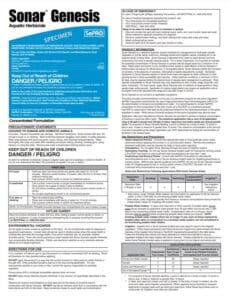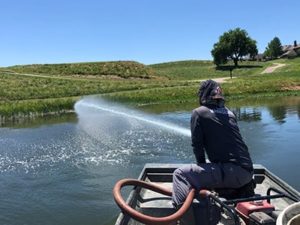
Example of EPA Registration Label
EPA-approved algaecides and herbicides are safe and effective components of any integrated pest management plan (IPM). They provide the fastest and most economical means of controlling pond weeds and other unwanted aquatic growth. Products registered for use in water pose no threat to people, pets, fish, nor wildlife when used in accordance with the label. EPA labels should be read carefully prior to use. The label is the LAW! It is critical to comply with all aspects of the label, including approved treatment sites, PPE requirements, and maximum dosage rates.
For many years, the number of EPA-approved algaecides and herbicides was limited to a handful of chemistries. However, recent research and development within the industry has added several new products to our toolbox. Many of these products are species specific; meaning they target invasive weeds while preserving desirable plants, so pond weed identification is critical. The safety factor of contemporary products is greatly enhanced. For example, pond managers were once limited to applying products in parts per million (ppm) dosages; however, newer products can achieve better results when applied in parts per billion (ppb) dosages. To put that into perspective, 1 ppb is equivalent to adding 1 drop of water into an Olympic sized swimming pool!
Contact vs. Systemic Herbicides
EPA-approved herbicides come in 2 major categories. Contact herbicides are fast acting but may require repeat treatments throughout the growing season here in north Texas. Systemic herbicides work much slower but provide longer lasting results. In some cases, a single systemic application in the spring will last the entire year.

High Volume Herbicide Application
Several products come in both granular and liquid formulations. Granular products are best for small DIY jobs due to ease of application. Granular formulas are slow release, making them more effective for spot treating isolated areas within a large pond. Liquid formulations are typically less costly than their granular counterparts; however, they require specialized spray equipment for proper application.
Step one when selecting a product for controlling pond weeds is to properly identify the pest species. Several aquatic plants look very similar; therefore, pond weed identification may require help from a qualified aquatic biologist. Another important factor in product selection is the use of the water body. Many products carry irrigation restrictions for turf and ornamentals. And finally, the budget of the pond owner should be considered. EPA-approved aquatic products can be costly when treating large areas. Magnolia Fisheries will consider all options to provide you with the most economical and effective solution.

Species ID is Critical!
When Should Herbicides be Applied?
Weather conditions greatly influence the timing and effectiveness of aquatic applications. All products require some degree of “hang time” to work properly. Therefore, treatments should not take place on days preceding forecasted rains. This is especially important when treating urban storm-water ponds designed to capture and quickly discharge runoff. Cloudy weather and cool water temperatures can also interfere with the product’s ability to enter the plant. Most aquatic products have label restrictions regarding maximum wind speeds and re-treatment intervals. Therefore, applying products on windy days or re-treating the same area too soon could be a violation of EPA law. Magnolia Fisheries will ensure that you are in accordance with all EPA, TCEQ, and TDA regulations.
There are certain times of year when algaecide and herbicide applications should be suspended. Prolonged periods of extreme heat with little or no wind make pond treatments risky. Even though the products themselves are safe, the decomposition of dying vegetation can lower dissolved oxygen levels. Improper pond treatments under these weather conditions can lead to devastating fish kills. Therefore, it is recommended to treat ponds in sections, allowing 14 days to pass between each application. This is critical when treating ponds without supplemental aeration or surface fountains.
The certified biologists at Magnolia Fisheries will handle your pond treatments from start to finish. Give us a call today!
